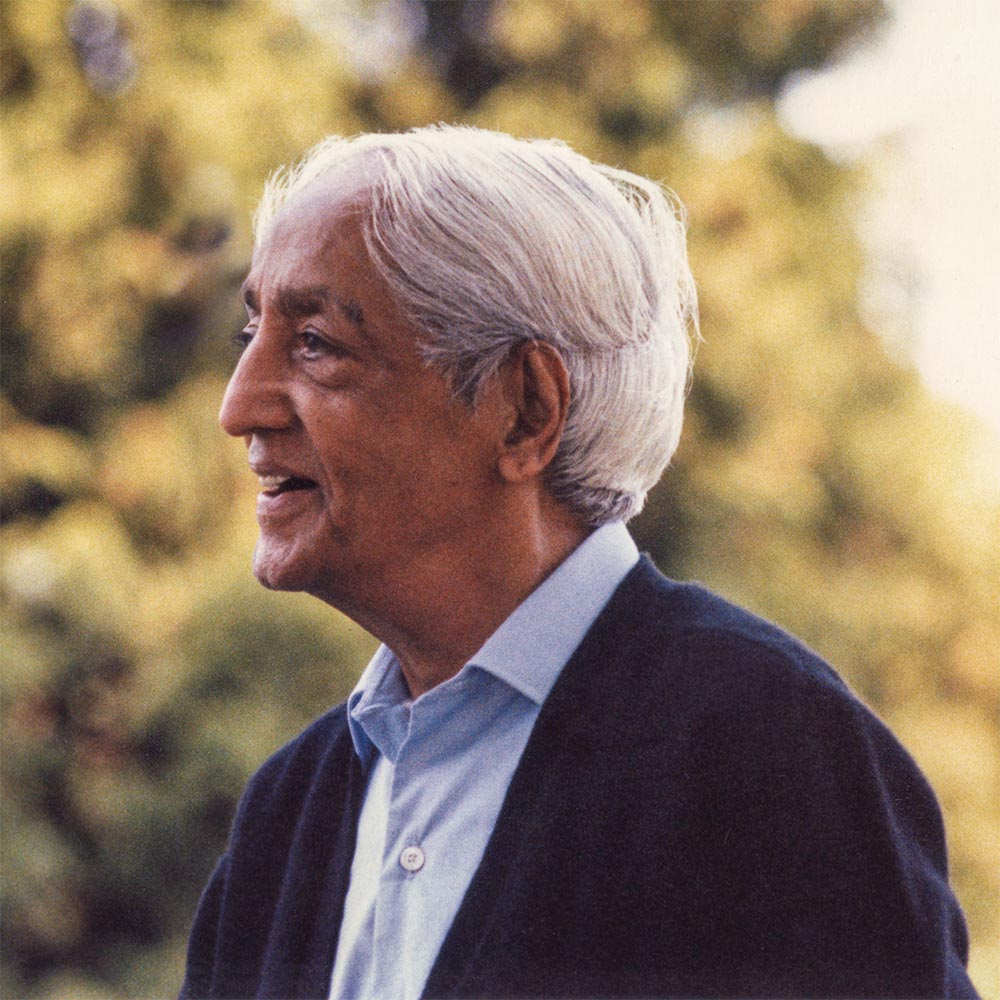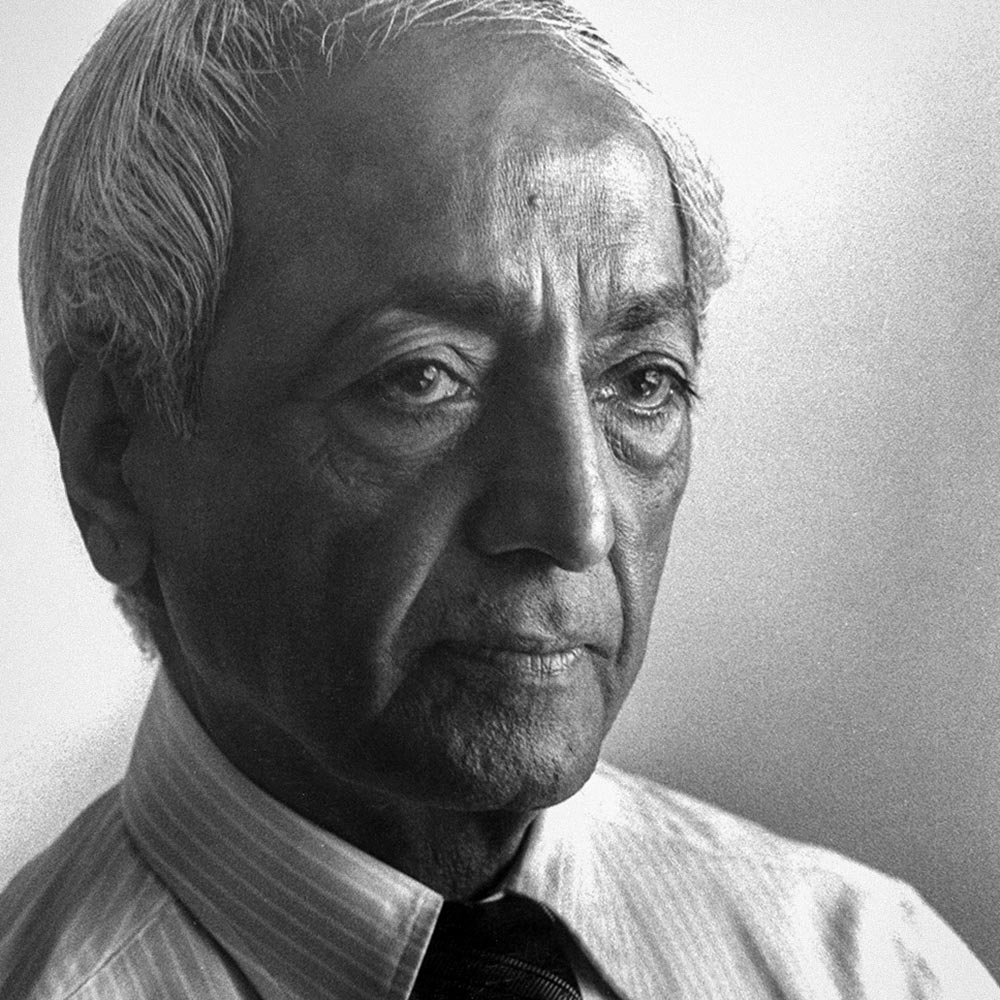What is fear? Why are you, or anybody, afraid? Is it based on not wanting to be hurt? Or is it that one wants complete security?
Krishnamurti, The Awakening of Intelligence
Read More
Fear is one of the greatest problems in life. A mind that is caught in fear lives in confusion and conflict, and therefore must be violent, distorted and aggressive.
Krishnamurti, Freedom From the Known
Read More
We are all afraid of something; there is no fear in abstraction, it is always in relation to something.
Krishnamurti, Freedom From the Known
Read More
One of the major causes of fear is that we do not want to face ourselves as we are.
Krishnamurti, Freedom From the Known
Read More
Escape, entertainment and courage are all forms of resistance to the actual fact of fear.
Krishnamurti, The Flight of the Eagle
Read More
Thought breeds fear as well as pleasure; they are both matters of time.
Krishnamurti, The Flight of the Eagle
Read More
When you see how thought breeds fear, what takes place?
Krishnamurti, You Are the World
Read More
Do I see the truth and the fact that moving away from fear increases fear?
Krishnamurti, The Impossible Question
Read More
As long as we are running away from fear, we do not look at it. The moment we stop and look at fear, it begins to dissolve.
Krishnamurti, Life Ahead
Read More
You are fear; you are not separate from it. The experiencer of fear is not an observer of it; it is fear itself, the very instrument of fear.
Krishnamurti, Commentaries on Living 2
Read More
The observer is the censor who does not want fear; the observer is the totality of all your experiences about fear.
Krishnamurti, Freedom From the Known
Read More
The desire not to be disturbed makes us avoid ‘what is’ and fear what might be. Fear is the ignorance of ‘what is’, and our life is spent in a constant state of fear.
Krishnamurti, Commentaries on Living 2
Read More
Fear dulls our minds, fear cripples our thinking, fear makes for darkness, and as long as we are frightened, we shall not create a new world.
Krishnamurti, Life Ahead
Read More
None of the problems of fear can be resolved through will, saying to oneself, ‘I will not be afraid.’ Such acts of will have no meaning.
Krishnamurti, Beyond Violence
Read More
There can be freedom from fear only when there is self-knowledge. Self-knowledge is the beginning of wisdom, which is the ending of fear.
Krishnamurti, The First and Last Freedom
Read More
These quotes only touch on the many subjects Krishnamurti inquired into during his lifetime. His timeless and universal teachings can be explored using the Index of Topics where you will find texts, audio and video related on many themes. Another option is to browse our selection of curated articles or more short quotes. Krishnamurti’s reply when asked what lies at the heart of his teachings can be found here. Many Krishnamurti books are available, a selection of which can be explored here. To find out more about Krishnamurti’s life, please see our introduction and the biography. We also host a weekly podcast, and offer free downloads. Please visit our YouTube channel for hundreds of specially selected shorter clips. Below, you can learn more about Krishnamurti and our charity which he founded in 1968.

Who Was Krishnamurti?
J. Krishnamurti (1895-1986) is widely regarded as one of the greatest thinkers and religious teachers of all time. He spoke throughout the world to large audiences and to individuals, including writers, scientists, philosophers and educators, about the need for a radical change in mankind. Referring to himself, Krishnamurti said:
He is acting as a mirror for you to look into. That mirror is not an authority. It has no authority, it’s just a mirror. And when you see it clearly, understand what you see in that mirror, then throw it away, break it up.
Krishnamurti was concerned with all humanity and held no nationality or belief and belonged to no particular group or culture. In the latter part of his life, along with continuing to give public talks, he travelled mainly between the schools he had founded in India, Britain and the United States, which educate for the total understanding of man and the art of living. He stressed that only this profound understanding can create a new generation that will live in peace.
Krishnamurti reminded his listeners again and again that we are all human beings first and not Hindus, Muslims or Christians, that we are like the rest of humanity and are not different from one another. He asked that we tread lightly on this earth without destroying ourselves or the environment. He communicated to his listeners a deep sense of respect for nature. His teachings transcend man-made belief systems, nationalistic sentiment and sectarianism. At the same time, they give new meaning and direction to mankind’s search for truth. His teaching is timeless, universal and increasingly relevant to the modern age.
I am nobody. It is as simple as that. I am nobody. But what is important is who you are, what you are.
Krishnamurti
Krishnamurti spoke not as a guru but as a friend. His talks and discussions are based not on tradition-based knowledge but on his own insights into the human mind and his vision of the sacred, so he always communicated a sense of freshness and directness, although the essence of his message remained unchanged over the years. When Krishnamurti addressed large audiences, people felt that he was talking to each of them personally, addressing their own particular problem. In his private interviews, he was a compassionate teacher, listening attentively to those who came to him in sorrow, and encouraging them to heal themselves through their own understanding. Religious scholars found that his words threw new light on traditional concepts. Krishnamurti took on the challenge of modern scientists and psychologists and went with them step by step, discussing their theories and sometimes enabling them to discern the limitations of their theories.
Krishnamurti left a large body of literature in the form of public talks, writings, discussions with teachers and students, scientists, psychologists and religious figures, conversations with individuals, television and radio interviews, and letters. Many of these have been published as books, in over 60 languages, along with hundreds of audio and video recordings.

The Krishnamurti Foundation
Established in 1968 as a registered charity, and located at The Krishnamurti Centre, Krishnamurti Foundation Trust exists to preserve and make available Krishnamurti’s teachings.
The Foundation serves a global audience by providing worldwide free access to Krishnamurti videos, audio and texts to those who may be interested in pursuing an understanding of Krishnamurti’s work in their own lives.
In describing his intentions for the Foundations, Krishnamurti said:
The Foundations will see to it that these teachings are kept whole, are not distorted, are not made corrupt.

